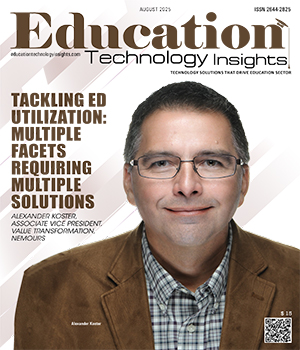THANK YOU FOR SUBSCRIBING
Be first to read the latest tech news, Industry Leader's Insights, and CIO interviews of medium and large enterprises exclusively from Education Technology Insights
The Human-Centered Technologist: Leadership Lessons for the Coming AI Disruption
Thomas Skill, Ph.D., Professor, Department of Communication, University of Dayton
 Thomas Skill, Ph.D., Professor, Department of Communication, University of Dayton
Thomas Skill, Ph.D., Professor, Department of Communication, University of DaytonThe last 40 years have been an incredible time to be a technologist in higher education, witnessing the emergence of the Internet and the powerful rise of artificial intelligence today.
As a faculty member and an academic IT leader, I've had the opportunity to study and work with these technologies on the frontlines. I first joined the University of Dayton as a professor in 1984 and later served as an academic administrator, including 19 years as the University’s Chief Information Officer. In 2025, I returned to my faculty position to focus on student career-readiness in the context of AI and professional communication.
My professional journey as an IT leader in higher education has been shaped by a core set of guiding principles, starting with some early lessons I learned as a manager.
I discovered that organizations often hire people for their strong technical skills but end up having to fire some of those talented folks because they lack the necessary “soft skills” such as teamwork, communication and conflict management. Those difficult conversations led me to appreciate the importance of bringing a communication perspective to my work as IT leader. That perspective led me to six guiding principles:
1. A leader's job is not to be the smartest person in the room; it is to ensure the team succeeds: Embrace your limitations and surround yourself with people who are smarter than you.
2. Always have your team's back: This means being a trusted advocate for your team, not making excuses. Supporting your team encourages them to take risks and think creatively.
3. Own your mistakes and share credit for your achievements: You're not fooling anyone if you deflect blame or take credit for others' work. It's critical to publicly acknowledge the contributions of others, even if you were the main catalyst for success.
4. Value kindness over competence: Allowing inconsiderate behavior creates a toxic environment that will lose its best talent. Kindness must be a core value, which sometimes means letting go of competent people who cannot engage kindly with colleagues.
5. A willingness to "roll up your sleeves:" The most credible leaders model the way by showing that no work is beneath them. This demonstrates that "chipping in" is part of building a dignified and productive organizational culture.
6. Praise in public and correct in private: This is a critical best practice for developing and mentoring your team.
“A leader's job is not to be the smartest person in the room but to ensure the team succeeds. Embrace your limitations and surround yourself with people who are smarter than you”
Shifting from my role as an IT leader to that of an educator, I see the coming impact of AI as very significant. This powerful Innovation can disrupt virtually every industry over the next several years. Thus, I believe that preparing today’s college students for a world of work dominated by AI requires that we carefully consider five critical elements:
1. Develop Foundational AI Literacy as a Core Competency
A comprehensive understanding of AI's capabilities, limitations and principles should become a core competency for all college graduates. Students don't need to be programmers, but they must grasp how AI functions, its realistic achievements and where human judgment is still indispensable. They need to leverage AI for tasks like ideation, research and content generation, turning it into a strategic advantage.
2. Cultivate Readiness for Technological Evolution, Adaptation & Agility
Given the rapid pace of AI innovation, preparing graduates isn't just about teaching current tools. It's about instilling a mindset of continuous learning and agility, so students are comfortable with change and can quickly assess and integrate new AI applications.
3. Emphasize Ethical Accountability as a Core Value
Businesses desperately need individuals who can use AI and guide its application with a strong moral compass. AI, if unchecked, can perpetuate biases, generate misleading information, or facilitate unethical practices. Our graduates must be rigorously equipped to critically evaluate AI outputs, identify potential ethical pitfalls and uphold the highest standards of integrity.
4. Embrace a Collaborative Human-AI Model to Drive Innovation
The most effective use of AI is not about replacement; it's about fostering powerful, synergistic collaboration. This human-centered approach leverages AI for preliminary tasks, while human skills like emotional intelligence and ethical judgment are applied to refine and elevate the output. This collaborative model transforms AI from a threat into a powerful partner.
5. Ensure the Centrality of Our Distinctively “Human Skills”
Timeless human skills are becoming even more valuable. These include communication, conflict resolution, relationship building and nuanced ethical decision-making. AI does not diminish curiosity, problem-solving and empathy; they become the differentiating factors that AI cannot replicate. Graduates who seamlessly combine AI proficiency with robust human skills will be the most sought-after.
By incorporating these five elements into our teaching and mentoring, AI-savvy graduates won't just secure jobs; they will be the innovators, strategic thinkers and ethical stewards who propel organizations forward in an increasingly AI-driven world, ultimately contributing to a more competitive and prosperous economy.
Read Also
Advancing Organizational Learning and Leadership in Community Colleges
Purposeful Leadership Through Professional Development
Pedagogical Implications of Chatting with AI to Learn
Advancing Higher Education through Data-Driven Innovation and Generative AI
Cultivating a Trust-Driven Technology Culture in K-12 Education
Reimagining Adult Education

I agree We use cookies on this website to enhance your user experience. By clicking any link on this page you are giving your consent for us to set cookies. More info

However, if you would like to share the information in this article, you may use the link below:
www.educationtechnologyinsightseurope.com/cxoinsights/thomas-skill-nid-3403.html


















